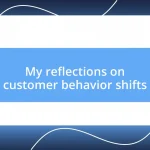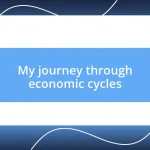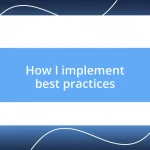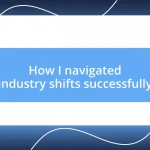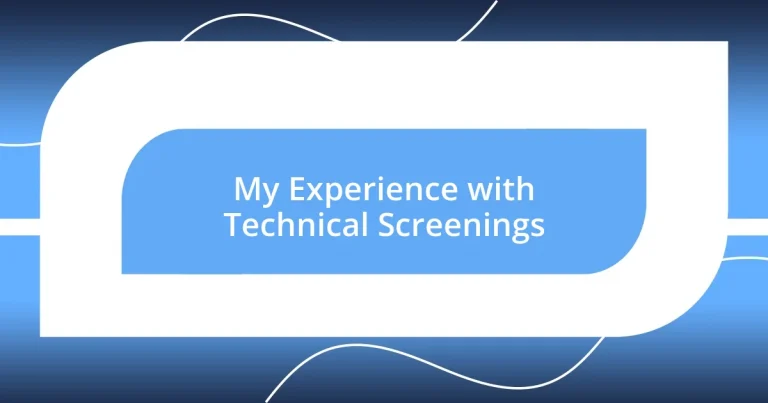Key takeaways:
- View technical screenings as opportunities for growth and learning, rather than just assessments.
- Establish a structured and proactive preparation strategy, including reviewing core concepts and practicing coding problems.
- Reflect on experiences post-interview to identify improvements and maintain a positive mindset toward setbacks.
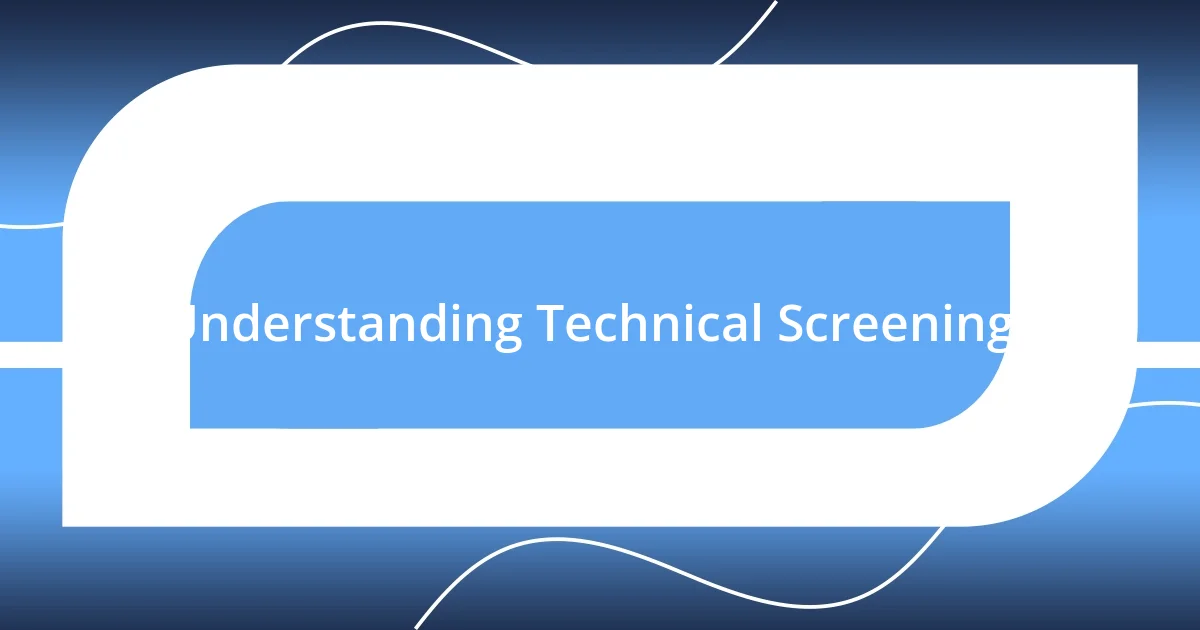
Understanding Technical Screenings
Technical screenings can feel like a daunting process, can’t they? I remember my first experience—it was nerve-wracking. Sitting in front of a computer, I couldn’t help but wonder if my skills were truly up to par or just a product of my own confidence. The feeling of being scrutinized can be overwhelming, but understanding what technical screenings aim to achieve can help ease some of that anxiety.
At their core, technical screenings are designed to assess a candidate’s problem-solving abilities and technical knowledge. I found that breaking down complex problems into smaller, manageable parts not only helped me during the screening but also clarified my thought process. This method allowed me to approach questions calmly, making the experience less intimidating and more like an engaging conversation.
As I navigated through questions, I often marveled at how the process could also serve as a learning opportunity. Each question revealed a gap in my knowledge that I could address later. It made me wonder—how many candidates treat these screenings solely as an assessment rather than a chance to better themselves? Embracing the idea of continuous learning transformed my perception of technical screenings from a mere hurdle into a stepping stone for personal and professional growth.
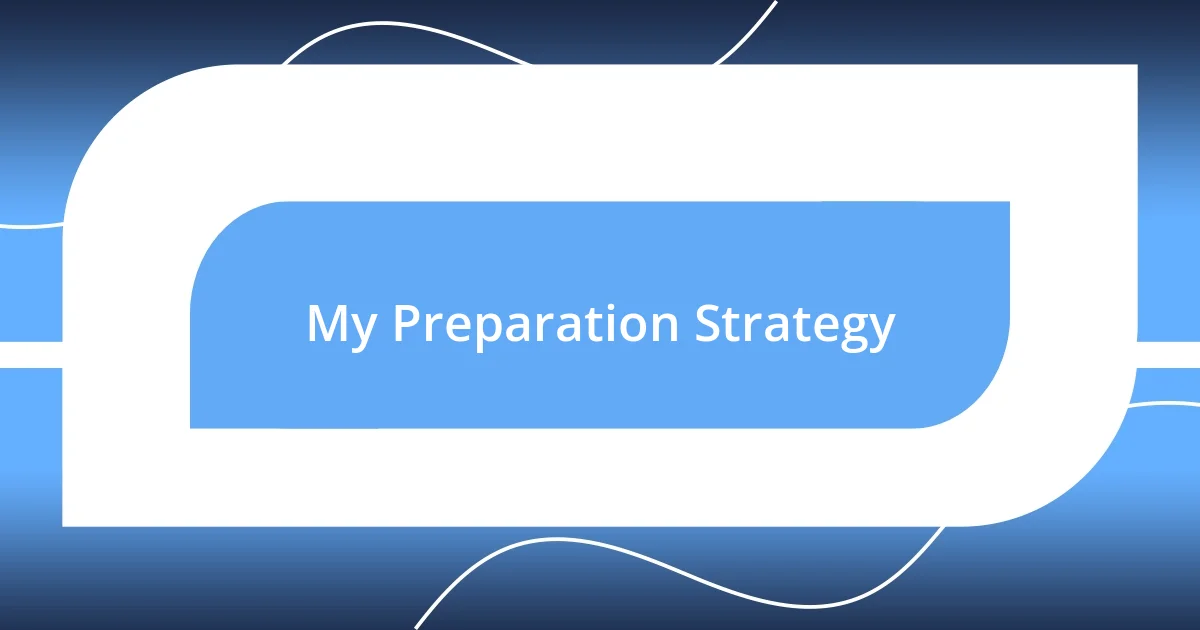
My Preparation Strategy
When I think about my preparation strategy for technical screenings, a few key practices stand out. One of the most significant changes I made was to create a structured study plan. I set aside specific times each week to focus on different topics, ensuring I didn’t just cram right before the screening. This approach gave me a sense of control and boosted my confidence considerably, transforming what once felt overwhelming into a series of manageable tasks.
Here’s what I focused on during my preparation:
- Reviewing Core Concepts: I revisited essential algorithms and data structures, which I knew would often come up.
- Practicing Coding Problems: I dedicated time daily to solving coding challenges on platforms like LeetCode and HackerRank, sharpening my problem-solving skills under time constraints.
- Mock Interviews: Partnering with a friend or mentor to simulate the screening experience helped me become comfortable with the interview format and receive constructive feedback.
- Reflecting on Mistakes: After each practice session, I took notes on my errors and researched solutions, which deepened my understanding and solidified my learning.
- Staying Calm and Centered: I incorporated mindfulness techniques to manage anxiety, allowing me to approach each problem without that nagging voice of self-doubt.
I found that establishing this routine not only enhanced my technical prowess but also shifted my mindset from fear of failure to a focus on growth. Each screening felt less like an evaluation and more like a chance to showcase my evolving skills. This perspective change fostered resilience and made my preparation journey genuinely rewarding.
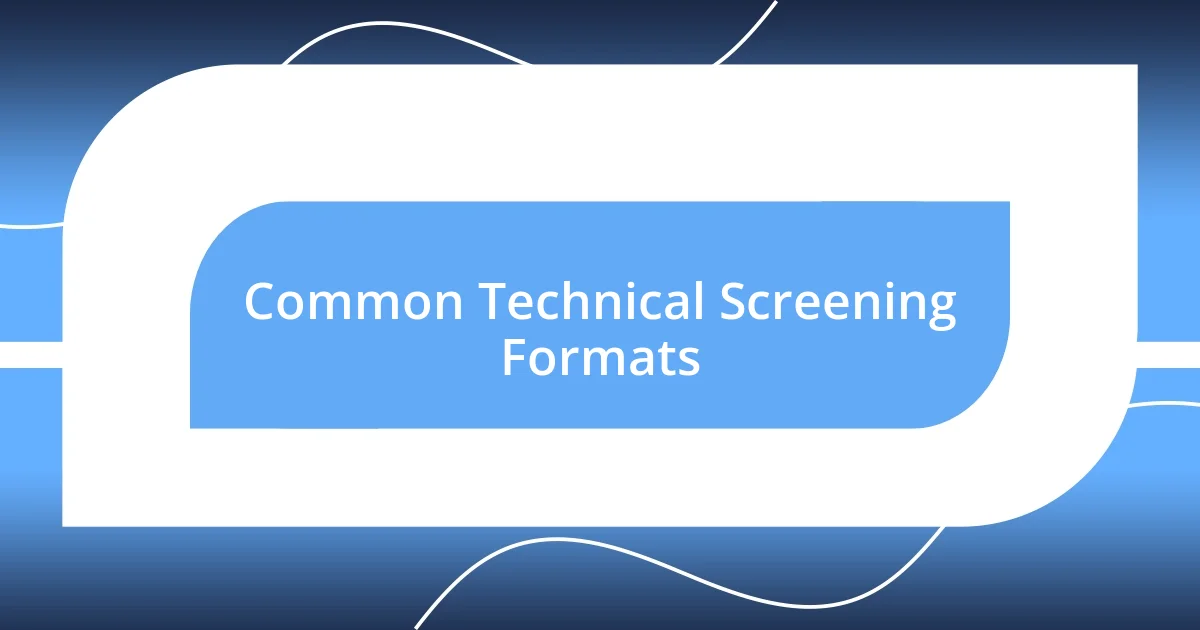
Common Technical Screening Formats
Technical screenings come in various formats, each offering its own set of challenges and opportunities to showcase a candidate’s skills. One format I encountered frequently was the live coding interview. In my experience, these sessions often took place over video calls, where I was expected to solve coding problems in real-time. The adrenaline rush as the clock ticked down, combined with the interviewer’s gaze upon my screen, was both exhilarating and nerve-wracking. I found that being clear in my thought process—and speaking aloud as I tackled the problems—was crucial. It transformed the experience into a collaborative problem-solving effort rather than a solitary test.
Another common format is the take-home coding assignment. Unlike the pressure of a live session, I felt a blend of relief and procrastination when handed a few days to submit my solution. This format allowed me to dive deep into research, refine my code, and submit my best work. However, this was also a double-edged sword—I learned that without the time constraints of a live interview, it was too easy to overthink every decision. I remember spending hours perfecting a single function, only to realize later that the initial solution hadn’t needed so much polish. Striking the balance between quality and timely submission was something I had to master.
Lastly, there are behavioral interviews intertwined with technical assessments. These interviews always seemed like a double-layered challenge to me. While I initially focused on demonstrating my technical skills, I came to understand that sharing stories from my past experiences was just as essential. I recall a moment when I was asked how I handled a significant project failure. Relating my feelings of disappointment and what I learned made for a more genuine conversation. I learned that my technical expertise should not overshadow the personal insights I had gained throughout my career.
| Technical Screening Format | Features |
|---|---|
| Live Coding Interview | Real-time problem-solving, interactive feedback from the interviewer |
| Take-Home Assignment | Time to research and refine solutions, less pressure but risk of overthinking |
| Behavioral Interview | Focus on past experiences and personal growth alongside technical skills |
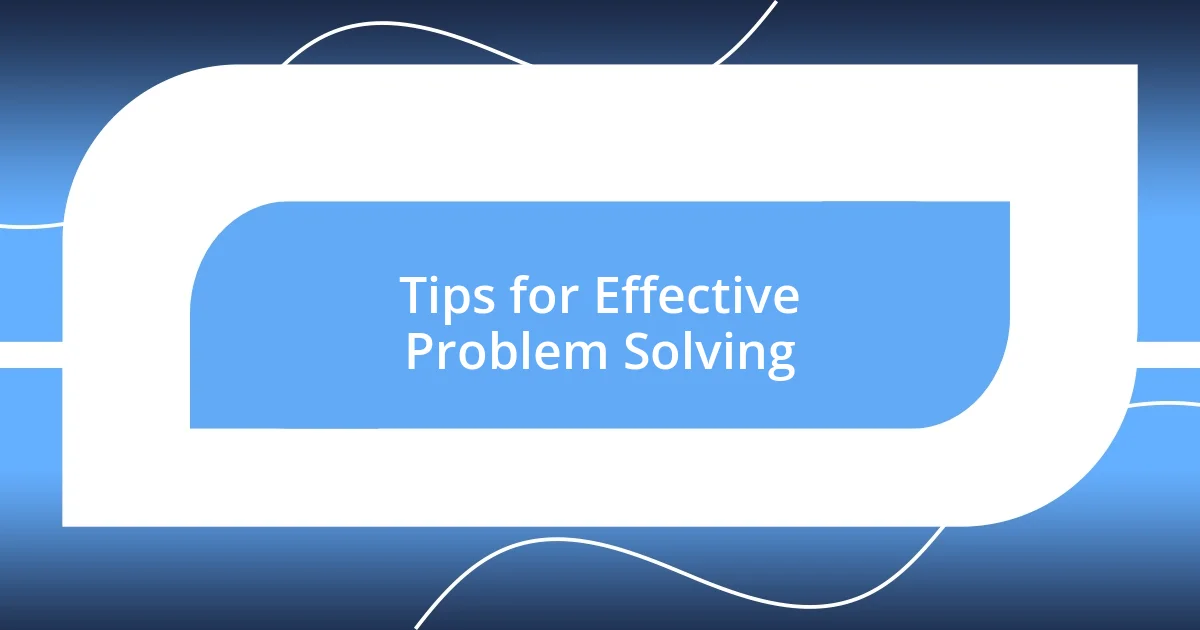
Tips for Effective Problem Solving
When tackling complex problems, I’ve found it helpful to break them into smaller, more manageable parts. This technique not only simplifies the challenge but also allows me to celebrate small victories along the way. Have you ever felt overwhelmed by a single problem? By isolating each component, I’ve noticed that what initially seemed insurmountable gradually transforms into a series of tasks I can tackle one at a time.
Additionally, practicing the art of asking clarifying questions has proven invaluable. In technical screenings, it’s easy to assume you understand what’s being asked. I remember a time when I blindly started coding based on my interpretation, only to realize later that I had missed critical details. Engaging in this dialogue and seeking clarification before jumping in can prevent wasted effort and steer you in the right direction quicker than you’d think.
Finally, I’ve learned the importance of maintaining a positive mindset, even amidst frustration. There were moments during screenings when I felt stumped and ready to give up. Instead, I reminded myself that every mistake is a step toward improvement. Just think—if I had walked away during those tough moments, I would have missed out on the growth that comes from navigating challenges. Embracing the struggle can illuminate pathways you might never have considered otherwise.

Handling Technical Interview Questions
When facing technical interview questions, I’ve found that keeping a calm demeanor is crucial. During one particularly challenging interview, I remember my heart racing as the interviewer tossed a complex algorithm problem my way. Instead of letting my anxiety overwhelm me, I took a deep breath and reiterated the question back to them. This not only helped me compose my thoughts but also reassured the interviewer that I was engaged and willing to clarify before diving in. Isn’t it interesting how something as simple as restating a question can provide clarity and confidence?
I’ve also discovered that articulating my thought process can be a game-changer. For instance, while tackling a difficult data structures question, I described my approach step by step, sharing not just what I was doing but why I was making those choices. This not only highlighted my analytical skills but also allowed the interviewer to follow my logic and guide me if I missed something. Have you noticed how revealing your thinking can transform a solitary exercise into a collaborative discussion?
Looking back, I see how vital it is to view technical questions as opportunities for growth. During one of my interviews, I encountered a topic I wasn’t well-versed in. Initially, I felt a rush of panic, but I chose to embrace the challenge. By openly discussing my unfamiliarity and expressing my eagerness to learn, I ended up having a more engaging conversation. Have you ever turned an unexpected curveball into an opportunity? This experience taught me that the way I handle uncertainty often matters more than the specific knowledge I possess.
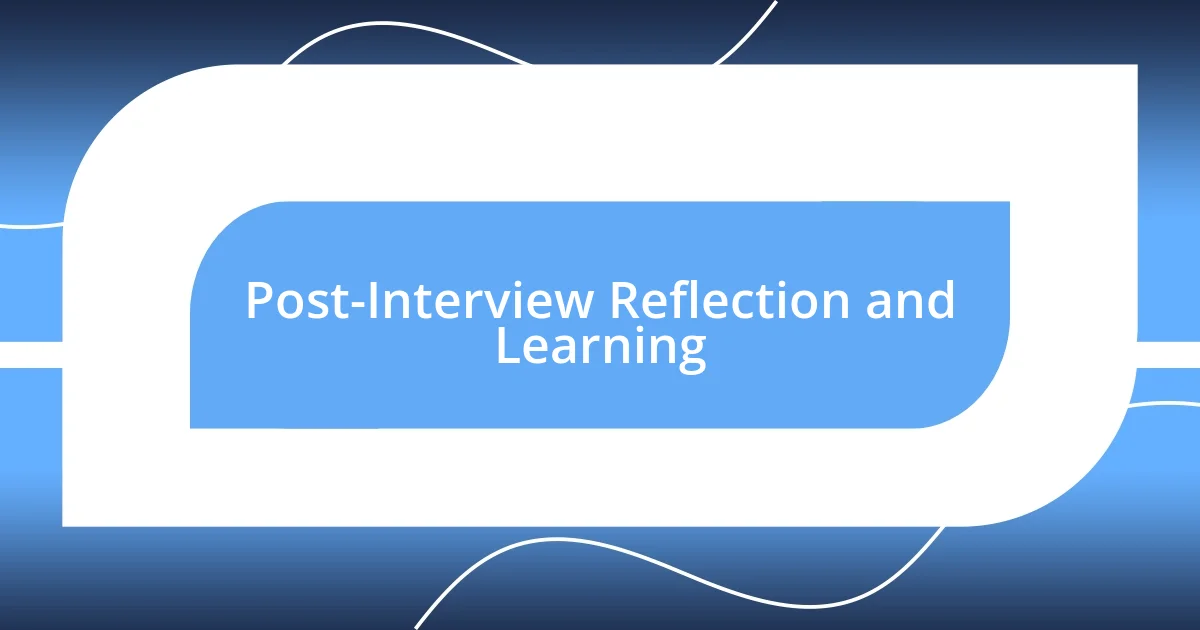
Post-Interview Reflection and Learning
After a technical interview, I always take some time to reflect on my performance. Recently, I found myself replaying a coding question that tripped me up. I realized that my anxiety led me to overcomplicate my solution. Have you ever experienced that moment of clarity after the fact, where everything suddenly seems simpler with hindsight? It’s in those reflections that I pick up on patterns in my thought process, allowing me to identify areas where I can improve.
I’ve learned not to shy away from discussing my weaknesses during these reflections. For instance, there was an interview where I struggled with a particular data structure. Instead of internalizing that failure, I shared this experience with a peer, who provided insights that helped illuminate the gaps in my understanding. Isn’t it fascinating how reaching out can unveil new perspectives? This practice of sharing has cultivated not only my technical skills but also my confidence in handling tough questions.
Moreover, I’ve come to appreciate the necessity of constructive self-talk in the aftermath of interviews. After one challenging screening, I caught myself engaged in negative thoughts, doubting my abilities. But then I reminded myself of the accomplishments I’ve achieved over the years. By shifting my mindset towards growth instead of defeat, I found a renewed sense of motivation. How can we turn setbacks into stepping stones? This process of reflection has become an essential part of my journey, shaping not only how I tackle interviews but also how I approach challenges in life.
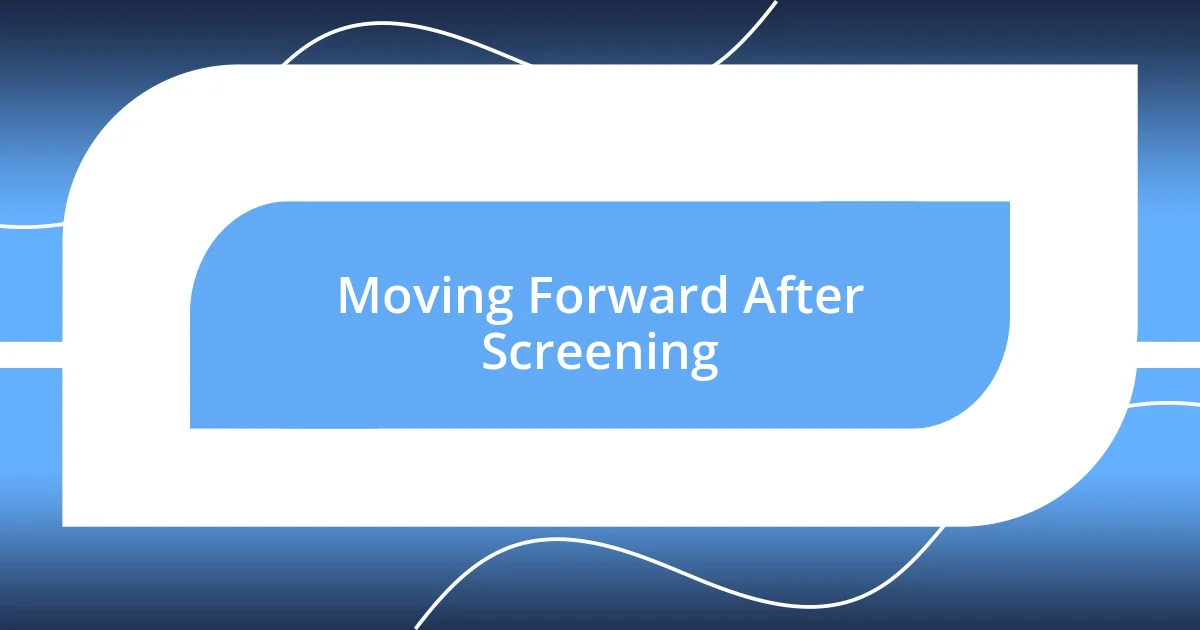
Moving Forward After Screening
Moving beyond the technical screening can feel like a heavy fog lifting. I remember a time when, after a particularly grueling interview, I found myself staring out the window, mulling over every question I stumbled on. In that moment, I realized that the post-interview phase isn’t just about evaluating performance; it’s also an opportunity for self-discovery. Have you ever felt that sense of clarity wash over you when you dissect each moment of an experience?
As I stepped away from the nerves of the interview, I leaned into an unexpected realization: each challenge holds a lesson. For example, I once faced a question that completely threw me off balance. Instead of sulking, I took a notebook and jotted down what went wrong while also charting out what I could do better next time. This process ignited a sense of ownership over my learning journey. Isn’t it empowering to take control of our narratives, even when things don’t go according to plan?
Embracing a proactive mindset after screenings has transformed my approach to future opportunities. I learned to treat every screening as a stepping stone, a chance to hone my skills and expand my knowledge. When I think about it, I often remind myself that rejection is not a reflection of my worth but a redirection toward something better. How about you? Do you view setbacks as gateways to growth, or do they weigh you down? Every missed opportunity has taught me to adapt, grow, and ultimately, move forward with renewed determination.
